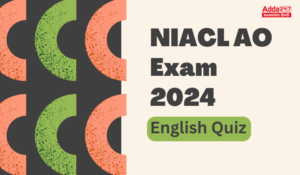IBPS PO Prelims English Quiz
The English language perplexes most of the students and makes one nervous during the examination even if the answer to the question is known. But there are no formulas to cramp or the longer the calculation to deal with. The mistakes that occur are because of the lack of confidence. With proper strategy, Study Notes, Quizzes, Vocabulary one can calm his/her nerves and excel in no time. Make the reading newspaper, editorial a habit, and also participate in the daily quiz. The IBPS PO 2019 is just one step away from your reach, for your aid here is the quiz under the Study Plan ‘FATEH’, on the IBPS PO Prelims English Quiz and we have Error Detection Quiz for 14th August 2019.
Directions (1-15): Read each of the following sentences to find out if there is any grammatical error in it. The error, if any, will be in one part of the sentence. The number of this part is your answer. If there is no error in the statement, then mark option (e) as your answer choice.
Q1.Just behind the royal standard-bearers (A)/came the Princess Ozma in her royal chariot, (B)/that was of gold encrusted(C)/ with emeralds and diamonds set in exquisite designs(D). /No Error (E)
A
B
C
D
No Error
Solution:
In the first part of the sentence, the word “that” will be replaced by the word “which” because here “which” points out to the royal chariot which is followed by (,) Comma. All other parts of the sentence are correct. Hence, option (c) will be the correct answer.
Q2. I flipped my wallet (A)/ open on her desk (B) /and let her look (C)/to the buzzer pinned to the flap (D)./ No Error (E)
A
B
C
D
No Error
Solution:
In the last part of the sentence, the word “to” will be replaced by the word “at”. ‘let’ is not followed by “to”. All other parts of the sentence are correct. Hence option (d) will be the correct answer.
Q3. With being Easter (A)/, you're likely (B) /to be feeling(C)/ stuffed, tired or grumpy (D)./ No Error (E)
A
B
C
D
No Error
Solution:
In the first part of the sentence, before the word Easter, “it” should be used because before every participle there is a subject of reference but in this case no participle is given. So we use “it” before “being”. All other parts of the sentence are correct. Hence option (a) will be the correct answer.
Q4. I negotiated the rail less stairs and dark corridor (A)/ without much too (B)/injury to my person, and managed (C)/to fumble the wooden latch open(D)./ No Error(E)
A
B
C
D
E
Solution:
In the second part of the sentence, “much too” will be replaced by “too much”. All other parts of the sentence are correct. Hence option (b) will be the correct answer.
Q5. Those present (A)/were all astonished (B)/to the results(C) /of the election (D)./ No Error (E)
A
B
C
D
E
Solution:
In the third part of the sentence “to” should be replaced by the preposition “at” because the words like startled/astonished/amazed is followed by the preposition “at”. All other options are absolutely correct. Hence option (c) is the correct choice.
Q6. Tom was obsessed by the belief that, (A)/ one by one, everyone around him (B)/ were being abducted (C)/and replaced by aliens (D). /No error (E)
A
B
C
D
E
Solution:
In the third part of the sentence “were” will be replaced by the word “was” because there are many pronouns like “Everybody, Anybody, Anything , Any, Each, Either, Nobody, Everyone” etc. which are always followed with singular verbs.
Q7. In another year, a capital receipt (A) /was credited as the (B)/ profit and loss account(C)/ but shown as an extraordinary item (D). /No error (E)
A
B
C
D
E
Solution:
In the second part of the sentence “as” should be replaced with the preposition “to” because the word Credited is always followed with “to”. All other options are correct. So option (b) is correct.
Q8. In Siena, Gissing worked on the Dickens study, and (A)/no sooner had he finishing it, (B)/ than he (C)/headed south to Naples(D)./No Error(E)
A
B
C
D
E
Solution:
In the second part of the sentence “finishing” should be replaced with the word “finished”.
The word starting with “No sooner… than” follows “had” then subject then verb (3rd). All other options are correctly used. So option (b) is correct.
The word starting with “No sooner… than” follows “had” then subject then verb (3rd). All other options are correctly used. So option (b) is correct.
Q9. Tom needs our (A)/ help and I'm (B)/going to make (C)/surely he gets it (D)./No Error (E)
A
B
C
D
E
Solution:
In the fourth part of the sentence the word “surely” should be replaced with “sure”. All other parts of the sentence are absolutely correct. So option (d) is absolutely correct.
Q10.Science has given (A)/us a lot, yet (B)/life is becoming(C)/more and more painful (D)./ No Error(E)
A
B
C
D
E
Solution:
The whole sentence is absolutely correct. So Option (e) is correct option.
Q11. Amid an escalating police crackdown (A)/ on protesters in Hong Kong, (B)/ Prime Minister Justin Trudeau said (C)/on Monday that he was “extremely concerned” for the situation (D). /No Error(E)
A
B
C
D
E
Solution:
In the fourth part of the sentence the preposition “for” must be replaced by “about”. All other options are absolutely correct. So option (d) is the correct sentence.
Q12.When one reads the Hindi Literature (A)/ of the Nineteenth century, (B)/ you find a striking contrast between (C)/the writings of Munshi Premchand and later day writers of popular Hindi fiction(D)/No Error(E)
A
B
C
D
E
Solution:
In the third part of the sentence “you” must be replaced with “one”. All other options are correct. So option (c) is the correct choice.
Q13.Except for (A)/you and he, (B)/ everyone has (C) /brought a gift for me(D)/No Error(E).
A
B
C
D
E
Solution:
In the second part of the sentence “he” must be replaced with “him”. So option (b) is the correct choice.
Q14.We have filed (A)/ a complaint against the (B)/ contractor whom (C)/we hired last month.(D)/No Error(E)
A
B
C
D
E
Solution:
In the third part of the sentence “whom” must be replaced by “who” as who is used for the person.
Here it refers to the contractor. All other options are correct. So option(c) is correct.
Here it refers to the contractor. All other options are correct. So option(c) is correct.
Q15. Japan is now (A)/ very different than (B)/ what it was (C)/ twenty years ago (D)./ No Error(E).
A
B
C
D
E
Solution:
In the second part of the sentence “than” must be replaced with “from” because different is followed with “from”. All other parts of the sentence are correct. So option (b) is correct.





 English Quiz For NIACL AO Mains 2024 Exa...
English Quiz For NIACL AO Mains 2024 Exa...

